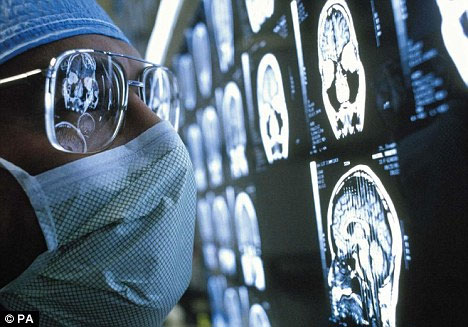New hope in treating Parkinson's
Millions of patients with Parkinson's syndrome have hope to improve their lives, even cure the disease after scientists have recorded positive results in a series of recent studies.
A joint study by British and Dutch scientists said a newly developed technique could improve the quality of life of Parkinson's patients by more than 30%. In the study published in the Journal of Neuroscience (USA), 10 Parkinson's patients in the early stages participated in a training course to control the area of the brain that controls movement using the power of thought and interest Through magnetic resonance imaging (MRI).
First, patients were asked to clench their hands while the team mapped the brain regions responsible for controlling movement. The patient is shown only the level of activity in these areas of the brain displayed on the front meter. Experts then asked them to imagine performing complex movements to activate the brain center and witness the corresponding increase in activity on the meter. By this practice method, they can increase or decrease the level of activity at will by thought. Professor David Linden, the team leader, described the process as "real-time neurological feedback" .

Although this brain training method does not help treat Parkinson's disease thoroughly, it can improve the motor function of patients, help them have a better life.'We found that 5 patients who received neurologic feedback could increase activity in the brain system, which is important for movement and this intervention also helps to improve motor speed. dynamic ', Professor Linden said.
Meanwhile, research by the Sloan-Kettering Institute in New York (USA) opens up hope for a cure for Parkinson's disease after tests show that human stem cells can repel the effects of the disease. .
Scientists have converted embryonic stem cells into neurons to create dopamine neurotransmitters , which play an important role in the development of Parkinson's disease. When these nerve cells are implanted in the brain, they secrete dopamine, which gradually eliminates the symptoms of agonist syndrome for 3-5 months. This type of cell has also been successfully transplanted in brown monkeys, which have a closer biology to humans and experts are waiting for results.
Researchers expect a similar solution could be developed for use by humans and they are planning to conduct testing. The team also plans to create new cells on a larger trial scale for 12 months, enough for transplanting for 100 patients after careful testing of safety. Tilo Kunath, a stem cell specialist at the University of Edinburgh (UK), said this was a major breakthrough toward the treatment of Parkinson's disease.
- Trial of treating cystic fibrosis on ... pigs
- New hope for kidney failure
- Nucleotic synthesis has hope in treating cancer
- Method of treating acne with leeches in China
- Nano medicine, hope to cure cancer
- Prospective research
- Gene Omega 3 gene therapy helps treat type 1 diabetes
- The prospect of treating Parkinson's by gene therapy
- The United Kingdom found the latest high mountain - Hope Mountain
- Yawn makes people wiser?
- Fact: Treating cancer with gold!
- Kissing can infect the virus causing infertility?
 Green tea cleans teeth better than mouthwash?
Green tea cleans teeth better than mouthwash? Death kiss: This is why you should not let anyone kiss your baby's lips
Death kiss: This is why you should not let anyone kiss your baby's lips What is salmonellosis?
What is salmonellosis? Caution should be exercised when using aloe vera through eating and drinking
Caution should be exercised when using aloe vera through eating and drinking Killing cancer cells with skin cells
Killing cancer cells with skin cells  Human teeth gradually shrink over time
Human teeth gradually shrink over time  Successful treatment of epilepsy with gamma knives
Successful treatment of epilepsy with gamma knives  Using artificial blood on human body
Using artificial blood on human body  Breakthroughs in research on
Breakthroughs in research on  The link between oral hygiene and heart disease
The link between oral hygiene and heart disease 